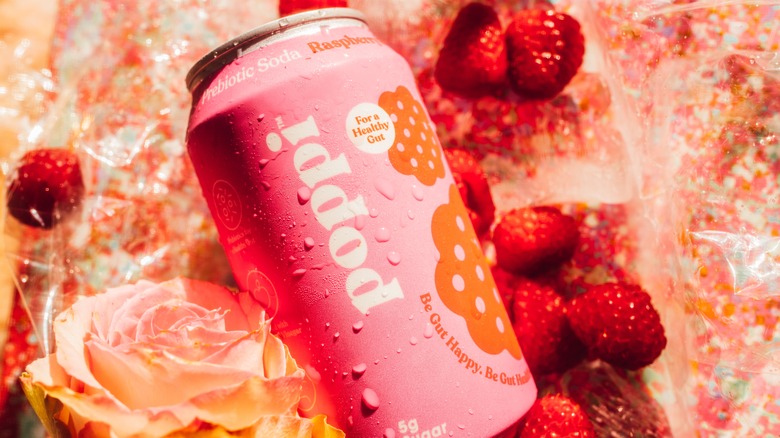Why Prebiotic Sodas Are Suddenly Everywhere
We may receive a commission on purchases made from links.
Prebiotic sodas are often referred to as a functional beverage — more than just satisfying, they are also meant to contribute positively to your health. They go beyond simply reducing sugar like other popular diet soda brands and instead use natural, gut-friendly ingredients like chicory root, inulin, and apple cider vinegar (in addition to fruit juices and sparkling water for flavor and effervescence). Traditional soda has been a mainstream beverage for decades, but in light of research showing the adverse health effects of sugary drinks, some people are looking to alternative brands like Olipop and Poppi.
According to market researcher SPINS (via Food Business News), over a year running from 2022 to 2023, U.S. sales of probiotic and prebiotic soda skyrocketed 210%. In 2023, market leader Olipop saw gross sales of $200 million, according to CEO Ben Goodwin, and was estimated to hit half a billion dollars in 2024. This is despite being sold in roughly 35,000 stores. "Usually when companies are getting up in that $200 to $250 million range, they're in 80,000, 90,000, 100,000-plus retail doors," Goodwin told Entrepreneur.
But how does the growing success of prebiotic soda compare to "big soda" or traditional advertising behemoths — like Coca-Cola with its iconic bottle — that have existed for over a century? Goodwin explains, "We lead the functional soda category, but we're also putting up real numbers against the traditional soda category." The CEO says that while some customers have quit traditional soda completely, in favor of Olipop, the majority still buy both.
What are prebiotics and how are they used in soda?
You're probably familiar with probiotics; the healthy bacteria found in food with live cultures, like yogurt. Prebiotics are non-digestible plant-based fibers that act as food for probiotics, helping good bacteria flourish which provides health benefits for us. Prebiotics are naturally found in foods like chicory root, dandelion greens, onions, bananas, apples, avocado, asparagus, oats, barley, flaxseeds, and jicama root.
Some of the prebiotic fiber sources found in Olipop, for example, are cassava root, chicory root, Jerusalem artichoke, and kudzu root. Both chicory root and Jerusalem artichoke contain a prebiotic fiber called inulin, which studies reveal can trigger the production of beneficial bacteria in the gut, improving digestion and overall health. Poppi brand's prebiotic source comes fromagave inulin, the fiber that's found in what's commonly known as the blue agave plant.
Still, the extent to which prebiotic sodas actually improve gut health is debatable. Clinical dietitian at New York's Huntington Hospital, Jessica Alfano, explained that prebiotic soda is healthier than traditional soda that's loaded with sugar, but told USA Today, "It's definitely not a product that's going to cure gut health just from drinking one or two cans a day." In June 2024, one consumer brought a lawsuit against Poppi due to the brand's low prebiotic fiber content of 2 grams. For comparison, a can of Strawberry Vanilla Olipop contains 9 grams of prebiotic fiber.

